Top 5 Mistakes to Avoid When Migrating Your Business Data to Xero
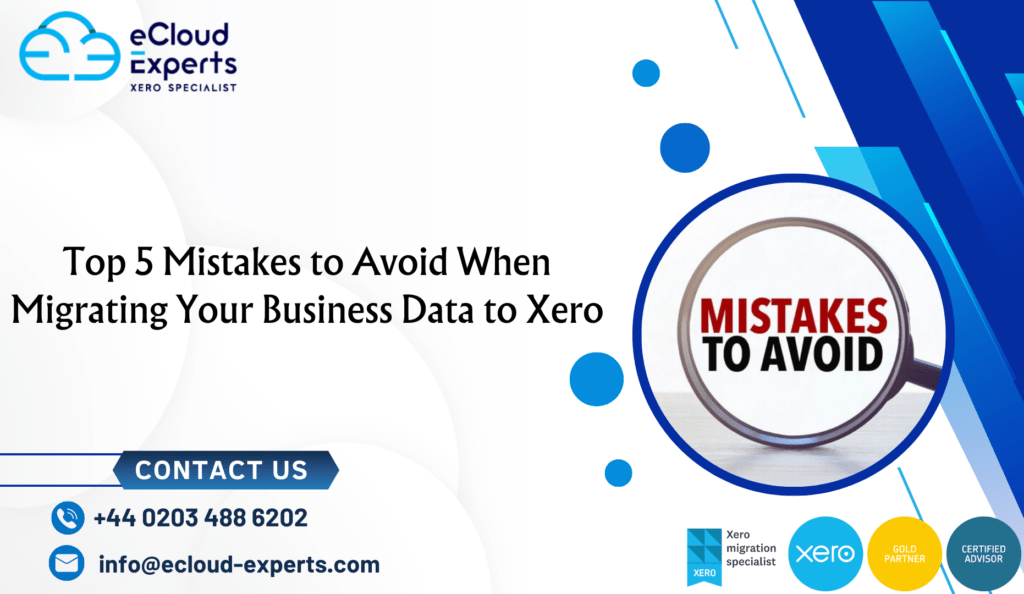
Migrating your business data to Xero is a crucial step toward improving your accounting processes, gaining real-time financial insights, and automating financial management. However, the process can be complex, and businesses often make mistakes that lead to delays, errors, and complications. eCloud Experts, as Xero’s global migration partner, specializes in guiding businesses through this transition, ensuring a smooth and efficient migration. In this blog, we’ll highlight the top 5 mistakes businesses should avoid when migrating their data to Xero and provide practical tips to ensure a successful transition. 1. Not Preparing Your Data Properly Before Migration One of the most significant mistakes businesses make during migration is failing to properly prepare their data. Inaccurate or incomplete data can lead to errors in financial reporting, wasting time during the migration and after it’s complete. Solution: Proper data preparation reduces the risk of errors, helping the migration process go smoothly and ensuring your financial reports are accurate post-migration. 2. Ignoring Multi-Currency and Tax Settings For businesses that operate internationally, configuring multi-currency transactions and tax settings properly is essential. These areas are often overlooked, which can lead to inaccurate financial calculations and potential compliance issues. Solution: Correctly configuring multi-currency and tax settings ensures that all transactions are recorded accurately and compliantly. 3. Failing to Back Up Your Data Before Migration Data loss or corruption is a risk during any migration. Without a backup, businesses may lose important financial records and data during the transfer. Solution: Backing up your data ensures that you can recover it easily if anything goes wrong during the migration. 4. Not Mapping Your Data Correctly Proper data mapping is essential to ensure that your old accounting system’s data is accurately transferred to Xero. Incorrect data mapping can result in missing or incorrect information, which could affect financial reports and business operations. Solution: Correct data mapping ensures that your financial records are correctly reflected in Xero, preventing errors in reports and transactions. 5. Overlooking Team Training and Familiarization with Xero Once the migration is complete, your team needs to know how to use Xero effectively. Many businesses overlook the importance of training their team on how to navigate Xero, which can result in inefficiencies, mistakes, and delays post-migration. Solution: Investing in proper training ensures that your team can use Xero effectively and confidently, reducing the risk of errors and inefficiencies. Conclusion: A Smooth and Successful Xero Migration with eCloud Experts Migrating your business data to Xero is a powerful way to enhance financial management, but it requires careful planning to avoid common mistakes. By preparing your data properly, configuring multi-currency and tax settings, backing up your data, mapping your data correctly, and training your team, you can ensure a smooth transition to Xero. As Xero’s global migration partner, eCloud Experts handles complex ERP migrations and data transfer from traditional accounting software to Xero. Whether your business is transitioning from legacy accounting systems or complex ERP software, we have the expertise to ensure that your migration is seamless and hassle-free. With over 12 years of experience in Xero migration and being recognized as a Xero Gold Champion Partner, eCloud Experts is here to support you every step of the way. Our team of Xero migration experts will guide you through the process, ensuring your transition is
Facebook Influencer Tax Returns: Your Ultimate Guide to Managing Income and Staying HMRC Compliant

Simplify Your Accounting, PR Gift Valuation, and Tax Obligations As Facebook remains a powerful platform for influencers, many creators are leveraging their audience to earn significant income. From sponsored posts to in-stream ads and fan subscriptions, Facebook influencers have diverse ways to monetize their content. But with multiple revenue streams comes the responsibility to manage finances, file tax returns, and stay compliant with HMRC regulations. At eCloud Experts, we provide tailored accounting, tax, and company formation services for Facebook influencers. Whether you’re earning from brand deals, affiliate income, or monetization tools, we ensure your accounts are managed efficiently while helping you save on taxes. Why Facebook Influencers Need Professional Accounting Support Facebook influencers often earn income through: While these income sources are exciting, HMRC considers most of them taxable. As a self-employed individual or Limited Company owner, you must declare all earnings accurately. Without proper financial management, you risk HMRC penalties, overpaying tax, or missing valuable deductions. At eCloud Experts, we: Do Facebook Influencers Need to File a Tax Return? Yes. If you are earning income through Facebook, you are considered self-employed and must file a Self-Assessment tax return annually. You must file a tax return if: At eCloud Experts, we simplify the tax return process, ensuring all earnings are reported correctly and you remain compliant with HMRC. What Counts as Taxable Income for Facebook Influencers? HMRC requires you to declare all forms of earnings, whether cash or non-monetary benefits. These include: 1. Sponsored Posts and Branded Content Brands pay influencers to feature products or services in posts, videos, or live streams. This income must be declared on your tax return. 2. In-Stream Ads and Video Monetization Revenue generated from in-stream ads or pre-roll ads on Facebook videos is fully taxable. 3. Fan Subscriptions Earnings from fans who pay a monthly subscription to access exclusive content or perks are treated as taxable income. 4. Affiliate Marketing and Referral Programs Income earned from affiliate links, referral codes, or commission-based promotions (e.g., Amazon Affiliates) must be reported to HMRC. 5. PR Gifts and Free Products If you receive PR gifts with an expectation to post content or promote a product, HMRC considers the retail value of these gifts as taxable income. Example: If a brand sends you a £500 product to feature in a Facebook post, this is classed as £500 income for tax purposes. PR Gift Valuation for Facebook Influencers PR gifts can be tricky to manage, especially if you receive multiple items throughout the year. To determine if a gift is taxable: Example At eCloud Experts, we: Allowable Expenses for Facebook Influencers To reduce your tax liability, you can claim business expenses that are incurred “wholly and exclusively” for your influencer activities. Common allowable expenses include: 1. Equipment and Tech 2. Software and Tools 3. Content Production Costs 4. Marketing and Promotions 5. Travel and Accommodation 6. Home Office Costs Should Facebook Influencers Form a Limited Company? If your Facebook income is growing, setting up a Limited Company may be more tax-efficient. Benefits of a Limited Company Our Services for Limited Companies Why Choose eCloud Experts? At eCloud Experts, we offer specialized tax and accounting solutions for Facebook influencers. Here’s how we help: How We Help Facebook Influencers Conclusion Facebook influencers often juggle multiple revenue streams, making tax and financial management challenging. Whether you earn through sponsored posts, in-stream ads, or fan subscriptions, professional support is key to staying compliant and maximizing your earnings. At eCloud Experts, we provide the expertise and tools to simplify your accounting, PR gift valuation, and tax returns, so you can focus on growing your platform and engaging your audience. Contact eCloud Experts today to take control of your finances and ensure HMRC compliance.
Accounting and Tax Solutions for Digital Entrepreneurs
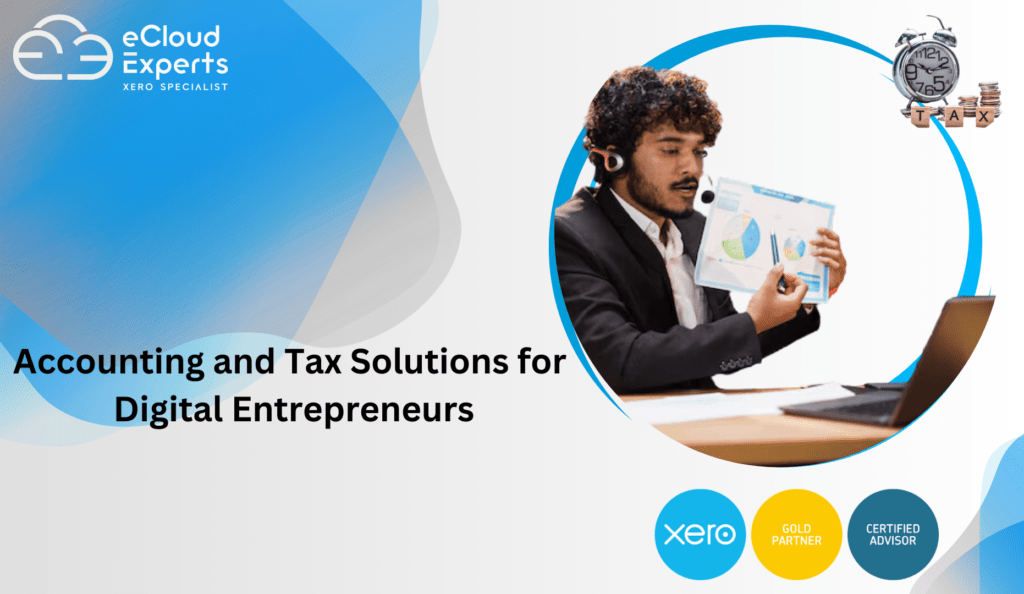
Manage Your Online Business Finances and Maximize Your Tax Savings The digital age has opened up endless opportunities for entrepreneurs to create and scale online businesses. Whether you’re selling digital products, running an e-commerce store, or offering online coaching, managing your finances effectively is crucial. From tracking income to claiming expenses and filing tax returns, digital entrepreneurs face unique financial challenges. At eCloud Experts, we specialize in providing tax, accounting, and advisory services tailored for digital entrepreneurs. Our expertise ensures you remain HMRC-compliant, maximize deductions, and focus on growing your business. Why Digital Entrepreneurs Need Professional Accounting Support As a digital entrepreneur, your income can come from a variety of sources, including: Handling multiple revenue streams, filing tax returns, and staying on top of VAT requirements can be time-consuming and complex. At eCloud Experts, we help you: Do Digital Entrepreneurs Need to File a Tax Return? Yes. If you’re earning income as a digital entrepreneur, HMRC considers you self-employed, and you are required to: You need to file a tax return if: At eCloud Experts, we simplify the process, ensuring you meet all deadlines and avoid penalties. What Counts as Taxable Income for Digital Entrepreneurs? HMRC requires you to declare all income earned from your digital business. This includes: 1. Digital Product Sales Revenue from selling e-books, courses, templates, or other digital downloads is fully taxable. 2. Subscription-Based Services Income from membership platforms or SaaS businesses (e.g., Patreon, Kajabi) must be reported. 3. Affiliate Marketing Income Earnings from affiliate programs, such as Amazon Affiliates or referral links, are taxable. 4. E-Commerce Revenue Income from selling physical or digital products on platforms like Shopify, Amazon, or Etsy must be declared. 5. Coaching and Consulting Services Fees from one-on-one coaching, group workshops, or consulting sessions are taxable. 6. Sponsored Content and Partnerships Payments or benefits received for promoting products or services online must be included in your tax return. VAT Considerations for Digital Entrepreneurs If your total income exceeds £85,000 in a rolling 12-month period, you are required to register for VAT. Common VAT Challenges for Digital Businesses At eCloud Experts, we: Allowable Expenses for Digital Entrepreneurs To reduce your tax liability, you can claim business expenses that are “wholly and exclusively” for your online business. Common examples include: 1. Website and Hosting Costs 2. Software and Tools 3. Advertising and Marketing 4. Equipment and Technology 5. Training and Development 6. Travel and Accommodation 7. Home Office Costs 8. Professional Services Should Digital Entrepreneurs Form a Limited Company? If your business is growing, forming a Limited Company may be more tax-efficient than operating as a sole trader. Benefits of a Limited Company for Digital Entrepreneurs Our Services for Limited Companies Why Choose eCloud Experts? At eCloud Experts, we provide expert tax and accounting solutions tailored for digital entrepreneurs. Here’s why we’re trusted by business owners across industries: How We Help Digital Entrepreneurs Conclusion Running an online business as a digital entrepreneur offers incredible flexibility and growth potential, but managing your finances can quickly become complex. From tracking income and expenses to filing tax returns and managing VAT, professional accounting support is essential for success. At eCloud Experts, we provide tailored solutions to help you stay compliant, maximize savings, and focus on growing your digital business. Contact eCloud Experts today to simplify your finances and take your business to the next level.
Tax and Accounting Solutions for Bloggers
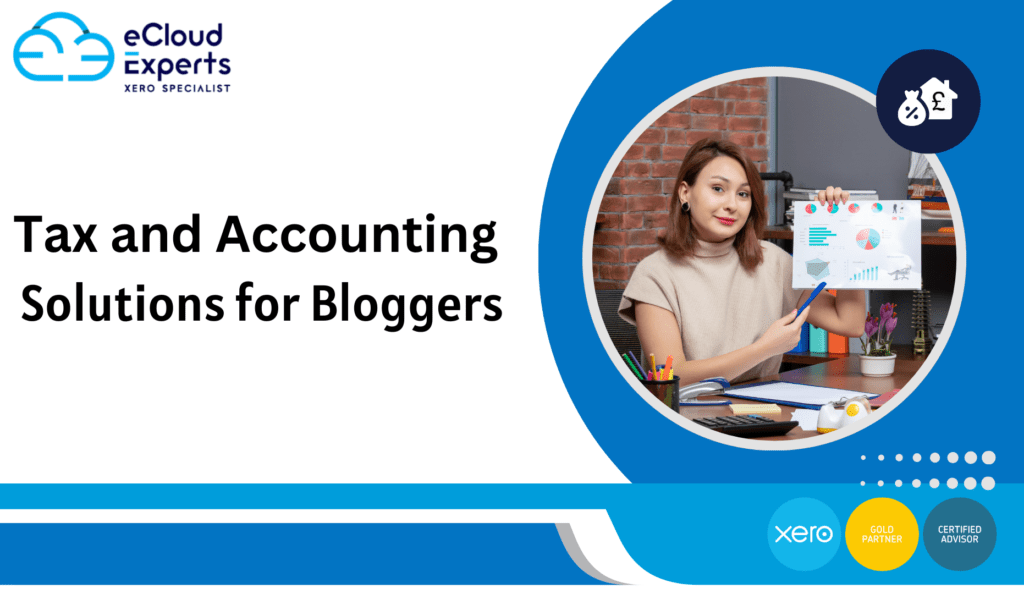
Manage Your Blogging Income, PR Gifts, and Stay HMRC Compliant Blogging has evolved into a thriving business for content creators worldwide. Whether you’re earning through sponsored posts, affiliate marketing, or selling digital products, managing your finances efficiently is essential for success. From filing tax returns to valuing PR gifts, understanding your financial obligations as a blogger can save you time, stress, and money. At eCloud Experts, we specialize in providing accounting, tax, and company formation services tailored for bloggers. We ensure you remain HMRC-compliant while maximizing your earnings and claiming all eligible deductions. Why Bloggers Need Professional Accounting Support As a blogger, your income often comes from a variety of sources, such as: With so many income streams to track, it’s essential to: At eCloud Experts, we provide tailored accounting solutions to help bloggers focus on creating great content while we manage their financial obligations. Do Bloggers Need to File a Tax Return? Yes. If you earn money through blogging, HMRC considers you self-employed, and you are required to: You must file a tax return if: If you’re earning significant income, we can also help you assess the benefits of operating as a Limited Company for increased tax efficiency. What Counts as Taxable Income for Bloggers? HMRC requires you to declare all forms of income earned through your blog. This includes: 1. Sponsored Blog Posts Payments received from brands or businesses to feature their products, services, or links in your blog. 2. Affiliate Marketing Income Earnings from affiliate links or referral programs, such as Amazon Affiliates, RewardStyle, or Skimlinks. 3. PR Gifts and Promotional Freebies If you receive gifts or products with an expectation of promotion, they are considered taxable income. Example: 4. Ad Revenue Income from Google AdSense, Mediavine, Ezoic, or other ad platforms must be included in your tax return. 5. Digital Product Sales Earnings from selling e-books, guides, courses, or other digital products through your blog. 6. Event Sponsorships Payments received for attending, speaking at, or writing about events. PR Gift Valuation for Bloggers As a blogger, you may receive PR gifts, freebies, or products for reviews and promotions. HMRC requires you to declare the market value of these gifts as taxable income if: Non-Taxable Gifts: Gifts sent with no obligation or expectation of promotion may not need to be declared. At eCloud Experts, we: Allowable Expenses for Bloggers To reduce your tax liability, you can claim expenses that are “wholly and exclusively” for your blogging business. Common examples include: 1. Website and Hosting Costs 2. Equipment and Technology 3. Software and Subscriptions 4. Content Production Costs 5. Marketing and Promotion 6. Travel and Accommodation 7. Home Office Costs 8. Professional Fees Should Bloggers Consider a Limited Company? If your blogging income has grown significantly, forming a Limited Company can be more tax-efficient than operating as a sole trader. Benefits of a Limited Company At eCloud Experts, we offer: Why Choose eCloud Experts? At eCloud Experts, we understand the unique needs of bloggers. Here’s why we’re trusted by content creators: How eCloud Experts Helps Bloggers Conclusion Blogging is an exciting and profitable career, but managing your finances can quickly become complex. With multiple income streams, PR gifts, and expenses to track, professional accounting support ensures you stay compliant with HMRC while optimizing your tax savings. At eCloud Experts, we simplify tax returns, PR gift reporting, and expense management for bloggers. Let us take care of your finances so you can focus on writing content your audience loves. Contact eCloud Experts today to manage your blogging accounts and taxes efficiently.
The Complete Guide to Migrating from Bench to Xero
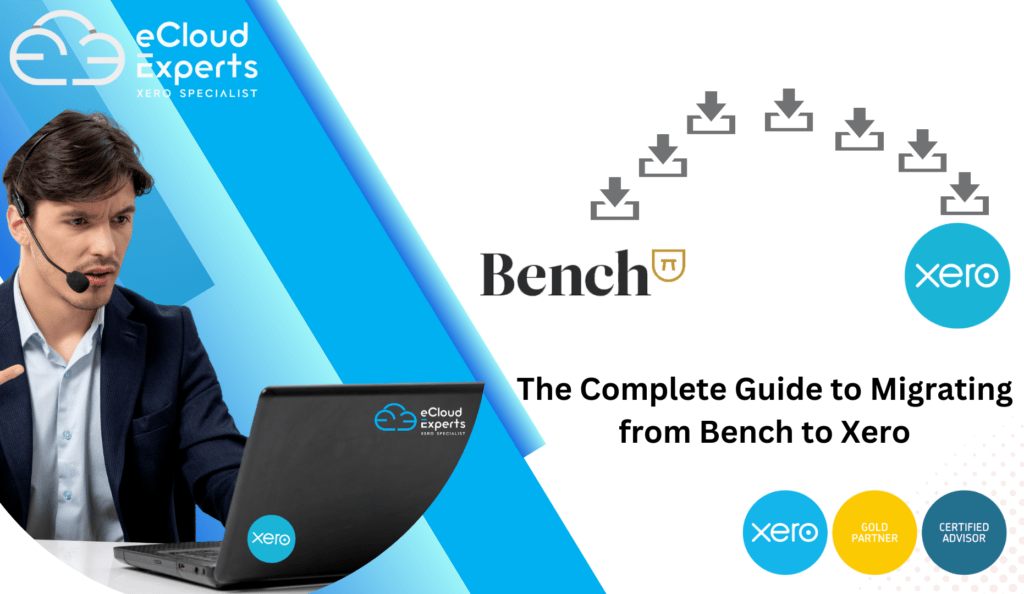
The unexpected shutdown of Bench Accounting has left countless small businesses searching for alternative solutions to manage their financial data. Xero, a globally recognized cloud accounting platform, is the perfect choice for businesses seeking reliability, scalability, and powerful tools to manage their finances. However, migrating from Bench to Xero requires careful preparation and a comprehensive approach to ensure a smooth transition. As global Xero migration specialists, Ecloud Experts understand the challenges involved in such migrations. In this guide, we’ll outline everything you need to successfully migrate your financial data from Bench to Xero while minimizing disruptions to your business. Why Choose Xero for Your Business? Xero is a cloud-based accounting solution designed to help businesses of all sizes manage their finances effectively. Here’s why it’s a great alternative to Bench: • Real-Time Reporting: Xero offers real-time insights into your financial performance with customizable dashboards and reports. • Seamless Integrations: Xero integrates with hundreds of apps, including payroll systems, inventory management tools, and eCommerce platforms. • Tracking Categories: Analyze income and expenses by department, project, or location without cluttering your chart of accounts. • Global Accessibility: As a cloud-based platform, Xero enables you to access your financial data from anywhere, on any device. By transitioning to Xero, businesses can continue to operate efficiently with advanced features that adapt to their needs. What You Need to Migrate from Bench to Xero Migrating to Xero is more than just transferring data; it’s about maintaining the accuracy and integrity of your financial records. Below is a list of essential reports and data you’ll need to prepare: 1. Opening Trial Balance The Opening Trial Balance establishes the starting point for your financial records in Xero. • Why It’s Needed: To ensure continuity in your financial accounts. • What to Include: Balances for assets, liabilities, and equity accounts as of the migration start date. 2. Opening Accounts Payable (Aged Creditors Report) This report details all outstanding supplier payments. • Why It’s Needed: To accurately track unpaid bills and liabilities in Xero. • What to Include: Supplier names, bill reference numbers, due dates, and amounts. 3. Opening Aged Receivables (Aged Debtors Report) The Aged Debtors Report lists all unpaid customer invoices. • Why It’s Needed: To ensure accounts receivable data is carried over correctly. • What to Include: Customer names, invoice numbers, due dates, and amounts. 4. General Ledger or Journal Reports The General Ledger Report provides a detailed record of financial transactions during the migration period. • Why It’s Needed: To ensure all historical transactions are accurately migrated. • What to Include: Transaction dates, account names, transaction types (e.g., sales, expenses), and amounts. Include tracking categories or cost centres for detailed analysis. 5. Bill Payment / Allocation Reports This report tracks payments made to suppliers and their allocation to specific bills. • Why It’s Needed: To prevent mismatched or missing payments during migration. • What to Include: Payment dates, methods, supplier names, and the bills to which payments were applied. 6. Customer Receipt / Allocation Reports This report details payments received from customers and their allocation to invoices. • Why It’s Needed: To accurately reflect accounts receivable balances in Xero. • What to Include: Customer names, payment dates, methods, and the invoices matched to payments. 7. Chart of Accounts The Chart of Accounts categorizes all financial transactions in Xero. • Why It’s Needed: To ensure transactions are properly organized for reporting and analysis. • What to Include: Account names, codes, and descriptions. 8. Contacts (Customers and Suppliers) Maintaining a complete Contacts List ensures seamless invoicing and payments in Xero. • Why It’s Needed: To retain customer and supplier details for ongoing transactions. • What to Include: Names, addresses, contact details, and additional information. 9. Closing Trial Balance The Closing Trial Balance confirms that all data has been successfully migrated at the end of the migration period. • Why It’s Needed: To verify that balances in Xero match the final figures from Bench. • What to Include: Final balances for all accounts, including assets, liabilities, and equity. 10. Closing Accounts Payable and Receivable Reports These reports provide a snapshot of unpaid bills and outstanding invoices at the end of the migration period. • Why It’s Needed: To ensure no outstanding balances are overlooked. • What to Include: Detailed lists of unpaid invoices and bills with due dates and amounts. How to Prepare for the Migration 1. Backup Your Data: Download all essential reports from Bench in Excel or CSV format. 2. Verify Data Accuracy: Cross-check reports for completeness and accuracy. 3. Format Data for Xero: Reorganize data to align with Xero’s import templates. 4. Set Up in Xero: Recreate tracking categories, chart of accounts, and contact lists in Xero. 5. Import and Verify: Use Xero’s import tools to upload data and verify accuracy. Common Challenges and How to Overcome Them • Incomplete Data: Work with an expert to ensure no key data is missed during the migration. • Mismatched Transactions: Use allocation reports to verify payments are linked to the correct bills and invoices. • Unallocated Entries: Double-check that all transactions have appropriate tracking categories or cost centres. How Ecloud Experts Can Help Migrating from Bench to Xero can be complex, but Ecloud Experts, global Xero migration specialists, are here to simplify the process. As a Xero Gold Champion Partner, we have the expertise to: • Extract and prepare data from Bench with precision. • Set up tracking categories, cost centres, and chart of accounts in Xero. • Import and verify data to ensure accuracy. • Provide post-migration support, including Xero training and ongoing assistance. Whether you’re managing multi-currency transactions or handling complex allocations, Ecloud Experts specialize in delivering seamless migrations tailored to your business needs. Why Trust Ecloud Experts? • Global Expertise: We’ve helped businesses worldwide transition to Xero effortlessly. • Certified Specialists: As a Xero Gold Champion Partner, we’re certified migration experts. • Comprehensive Support: From data preparation to
Seamless Migration from Bench to Xero with eCloud Experts
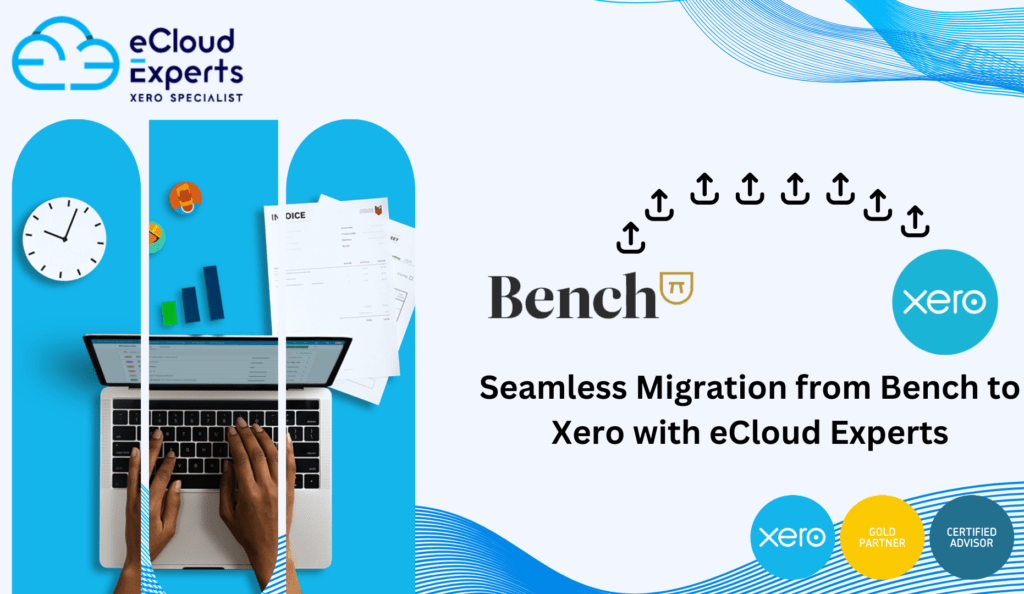
The unexpected closure of Bench on December 27, 2024, has left businesses, CPA firms clients, and bookkeeping firms clients searching for a reliable accounting solution. While Bench provided basic bookkeeping services, it lacked the scalability, flexibility, and advanced features offered by Xero. At eCloud Experts, we specialize in migrating businesses and accounting professionals from Bench to Xero, ensuring a smooth, accurate, and efficient transition with minimal disruption. Why Migrate from Bench to Xero? Xero is a robust cloud-based accounting platform designed to cater to the needs of businesses, CPA firms, and bookkeeping firms managing multiple clients. Here’s why migrating to Xero is a smart choice: 1. Comprehensive Accounting Tools Xero offers advanced features beyond basic bookkeeping, including: • Multi-currency accounting • Payroll and expense management • Automated bank reconciliations • Real-time financial reporting • Inventory tracking and management These tools help businesses and accounting professionals streamline financial operations and scale effectively. 2. Scalable for Businesses and Firms Xero supports unlimited users, making it a great solution for businesses of all sizes and for CPA firms clients and bookkeeping firms clients managing multiple entities. 3. Real-Time Collaboration Xero’s cloud-based platform enables real-time collaboration between business owners, accountants, and bookkeeping professionals, ensuring seamless workflows. 4. Automation and Efficiency Automate repetitive tasks such as invoicing, bank reconciliations, and tax filing, saving time and improving accuracy. 5. Global Accessibility Access your financial data anywhere, anytime, from any device, making Xero an ideal solution for remote or hybrid work environments. Challenges When Migrating from Bench to Xero Migrating from Bench to Xero involves several complexities, particularly for CPA firms and bookkeeping firms managing multiple clients. Here are some common challenges: 1. Data Export and Formatting Bench and Xero have different data structures, requiring precise formatting to ensure compatibility during migration. 2. Custom Chart of Accounts Setup Bench’s simplified chart of accounts may need customization in Xero to suit specific business or client needs. 3. Historical Data Transfer Transferring years of financial data, including invoices, payments, and reconciliations, requires meticulous attention to detail. 4. Multi-Currency Transactions For businesses operating globally, ensuring accurate conversion and tracking of multi-currency transactions is critical. 5. Integration with Third-Party Tools Reconnecting apps like Shopify, Stripe, or A2X to Xero can be complex and requires expertise to maintain seamless workflows. How eCloud Experts Simplifies the Migration At eCloud Experts, we provide tailored migration services designed to address these challenges and ensure a hassle-free transition from Bench to Xero: 1. Initial Consultation We start by assessing your Bench data and understanding your specific business or client requirements. 2. Data Mapping and Preparation Our team carefully maps your chart of accounts, transactions, and financial data to Xero, ensuring accuracy and compatibility. 3. Historical Data Migration We migrate all historical data, including invoices, bills, payments, and reconciliations, ensuring a complete and accurate transfer. 4. Custom Chart of Accounts Setup We tailor Xero’s chart of accounts to meet the unique needs of your business or clients, enabling better financial reporting. 5. Integration with Third-Party Apps Whether you’re using Shopify, Stripe, or A2X, we reconnect and configure these tools to work seamlessly with Xero. 6. Multi-Client Management for CPA and Bookkeeping Firms For CPA firms and bookkeeping firms, we handle simultaneous migrations for multiple clients, ensuring data accuracy and compliance. 7. Quality Assurance and Testing Before completing the migration, we verify data accuracy and test functionality to ensure everything works perfectly in Xero. 8. Training and Support Post-migration, we provide training for your team or clients and ongoing support to help you maximize Xero’s features. Why Choose eCloud Experts for Your Migration? 1. Global Migration Experts With years of experience in data migrations, we’ve successfully helped businesses and accounting firms worldwide transition to Xero. 2. Tailored Solutions for CPA and Bookkeeping Firms We specialize in providing migration services for CPA firms clients and bookkeeping firms clients, ensuring multi-client migrations are handled seamlessly. 3. Certified Xero Advisors As Xero Gold Champion Partners, we bring unmatched expertise and precision to every migration project. 4. Comprehensive Post-Migration Support From initial setup to ongoing training, we’re with you every step of the way to ensure a smooth transition. 5. Accurate and Reliable Transfers Our meticulous process ensures that all data is transferred accurately, maintaining financial integrity and compliance. Benefits of Migrating to Xero Switching to Xero offers several advantages for businesses, CPA firms clients, and bookkeeping firms clients: 1. Improved Financial Management Xero’s powerful tools simplify tasks like invoicing, payroll, and expense tracking, enabling better control over finances. 2. Enhanced Collaboration Real-time access to financial data allows businesses, accountants, and bookkeepers to collaborate seamlessly. 3. Automation for Efficiency Automate recurring tasks such as invoicing, tax filing, and reconciliations, saving time and reducing manual errors. 4. Scalability for Growth Xero’s flexible features make it a scalable solution for businesses of all sizes and CPA/bookkeeping firms with diverse client portfolios. 5. Seamless Integration Connect Xero with tools like Shopify, Stripe, A2X, and Synder to streamline operations and enhance productivity. Frequently Asked Questions 1. How long does it take to migrate from Bench to Xero? Most migrations are completed within 3–5 business days, depending on the complexity of the data. 2. Can you transfer historical data from Bench to Xero? Yes, we ensure all historical data, including invoices, bills, payments, and reconciliations, is transferred accurately. 3. Do you handle multi-client migrations for CPA firms? Absolutely. We specialize in handling simultaneous migrations for CPA and bookkeeping firms managing multiple clients. 4. Will my integrations work in Xero? Yes, we reconnect and configure integrations like Stripe, Shopify, and A2X to ensure smooth functionality. 5. Do you provide training after migration? Yes, we offer training to help businesses and accounting professionals get the most out of Xero’s features. Whether you’re a business owner, CPA, or bookkeeping professional, migrating from Bench to Xero is a smart decision. At eCloud Experts, we make the process seamless, ensuring accurate data transfer and a smooth transition. Contact us today to discuss your migration needs and
Accounting and Bookkeeping Services for Startups: Why eCloud Experts is the Right Partner for You
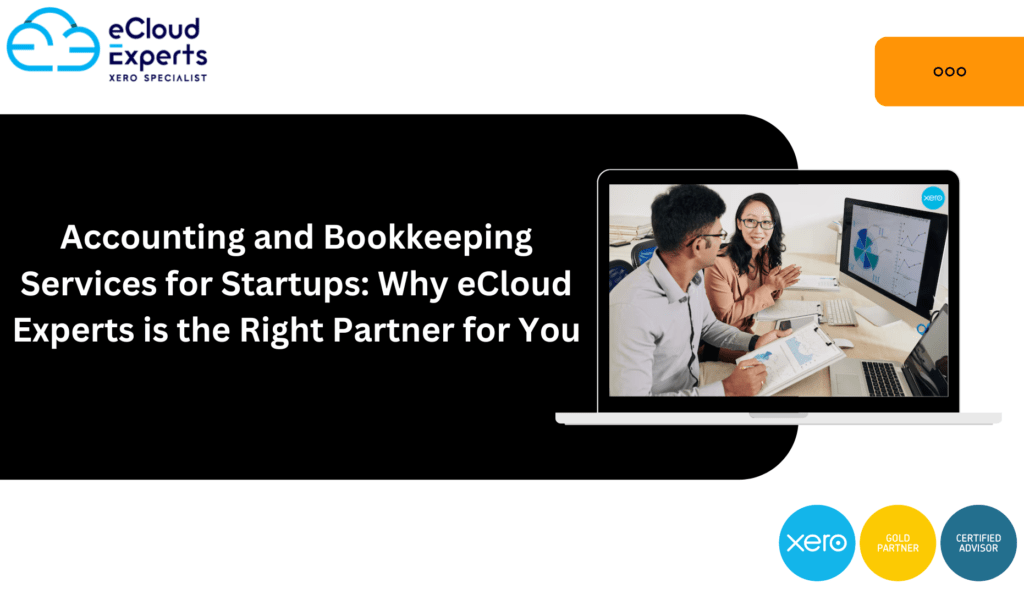
Starting a business is exhilarating, but managing the financial aspects can often feel overwhelming. As a startup founder, your time is best spent growing your business, developing innovative products, and expanding your market reach. However, one critical element that you cannot afford to overlook is accounting and bookkeeping. Poor financial management is one of the leading causes of startup failure. At eCloud Experts, we specialize in providing accounting and bookkeeping services tailored specifically for startups, ensuring they have the financial clarity and structure needed to succeed in a competitive market. In this blog, we’ll explore the importance of professional accounting for startups, the services we offer, and why partnering with us is a smart choice for your business. Why Accounting and Bookkeeping are Crucial for Startups As a startup, keeping your financials in order isn’t just about compliance; it’s about building a foundation for long-term success. Here’s why professional accounting and bookkeeping services are essential: 1. Regulatory Compliance Startups must comply with various financial regulations, including: • Registering for VAT or GST, if applicable. • Filing accurate tax returns. • Managing payroll taxes and employee benefits. Failing to meet these requirements can result in penalties and damage your reputation. Professional accountants help you stay compliant from day one. 2. Effective Cash Flow Management Cash flow is the lifeblood of any business, especially startups. Accurate bookkeeping allows you to: • Monitor your income and expenses. • Avoid running out of cash during critical growth phases. • Plan for upcoming financial needs. 3. Investor Confidence Startups often rely on funding to scale. Investors need detailed, accurate financial records before committing their money. Clean, organized financial statements instill confidence and increase your chances of securing funding. 4. Strategic Decision-Making Detailed financial reports provide valuable insights, helping you make informed decisions. From identifying profitable revenue streams to optimizing operational costs, accounting data is essential for strategic planning. Accounting and Bookkeeping Challenges Faced by Startups Many startups try to manage their finances independently, often using spreadsheets or basic software. While this might work initially, it can lead to several challenges as your business grows: • Lack of financial expertise can result in errors and missed deadlines. • Manual processes are time-consuming and prone to mistakes. • Difficulty in scaling financial systems to match business growth. • Failure to track key metrics like profitability, burn rate, or runway. Outsourcing your accounting and bookkeeping to professionals like eCloud Experts helps you overcome these challenges and focus on scaling your business. Our Specialized Accounting and Bookkeeping Services for Startups At eCloud Experts, we offer a range of services tailored specifically for startups, combining cutting-edge technology with industry expertise to simplify your financial processes. 1. Cloud-Based Bookkeeping Our cloud-based bookkeeping services ensure your financial data is always up-to-date and accessible in real time. We work with leading accounting platforms like: • Xero • QuickBooks Online • Other cloud-based solutions Our services include: • Recording all transactions (income, expenses, payroll, etc.). • Bank and credit card reconciliation. • Managing accounts receivable and payable. • Preparing monthly reports to give you a clear financial picture. 2. Startup Payroll Management Payroll can be complex, especially for startups hiring their first employees. We provide comprehensive payroll setup and management, including: • Automating salary payments. • Calculating and submitting PAYE, NI, and other taxes. • Managing employee benefits and statutory deductions. 3. Tax Compliance and Preparation Taxation is one of the most challenging aspects for startups. We ensure your startup complies with tax laws while minimizing liabilities. Our tax services include: • Registering for VAT/GST (if required). • Preparing and filing corporate tax returns. • Advising on tax reliefs and deductions available for startups. 4. Financial Reporting and Analysis Financial clarity is critical for startups to grow. We offer detailed reporting and analysis, including: • Profit and loss statements. • Balance sheets. • Budgeting and cash flow forecasting. These reports help you understand your financial health and make data-driven decisions. 5. Startup Advisory Services Beyond traditional accounting, we provide consultancy services to help startups scale effectively. These include: • Setting up robust accounting systems. • Preparing financial projections for investors. • Advising on government grants, loans, and funding opportunities. Benefits of Outsourcing Accounting and Bookkeeping to eCloud Experts When you outsource your accounting and bookkeeping to eCloud Experts, you’re not just hiring accountants—you’re gaining a strategic partner dedicated to your startup’s success. 1. Expertise in Startup Accounting We understand the unique challenges startups face, from managing cash flow to preparing for growth. Our team has years of experience working with startups across various industries. 2. Scalable Solutions Our services grow with your business. Whether you’re a one-person operation or scaling rapidly, we tailor our solutions to meet your needs. 3. Access to Advanced Tools We leverage industry-leading tools like A2X, ApprovalMax, Dext, and Synder to automate and streamline your financial processes. These tools save time, reduce errors, and provide real-time insights. 4. Global Expertise Operating in multiple jurisdictions? No problem. Our team has experience managing multi-currency accounting and cross-border tax compliance, making us an ideal partner for startups with global ambitions. 5. Cost-Effective Services Startups often operate on tight budgets. Our affordable accounting and bookkeeping packages ensure you get top-notch service without breaking the bank. How eCloud Experts Helps Startups Build a Strong Financial Foundation At eCloud Experts, we go beyond basic accounting and bookkeeping. We aim to become an integral part of your startup’s success story by: • Helping you establish financial processes from the ground up. • Offering regular reviews to ensure your financial systems remain efficient. • Providing ongoing support, including training your team on cloud-based platforms. We understand that every startup is unique. That’s why we customize our services to align with your specific needs, industry, and growth stage. Why Startups Shouldn’t Delay Setting Up Proper Accounting
ERP Systems to Xero Migration Services: A Global Solution for Simplified Accounting
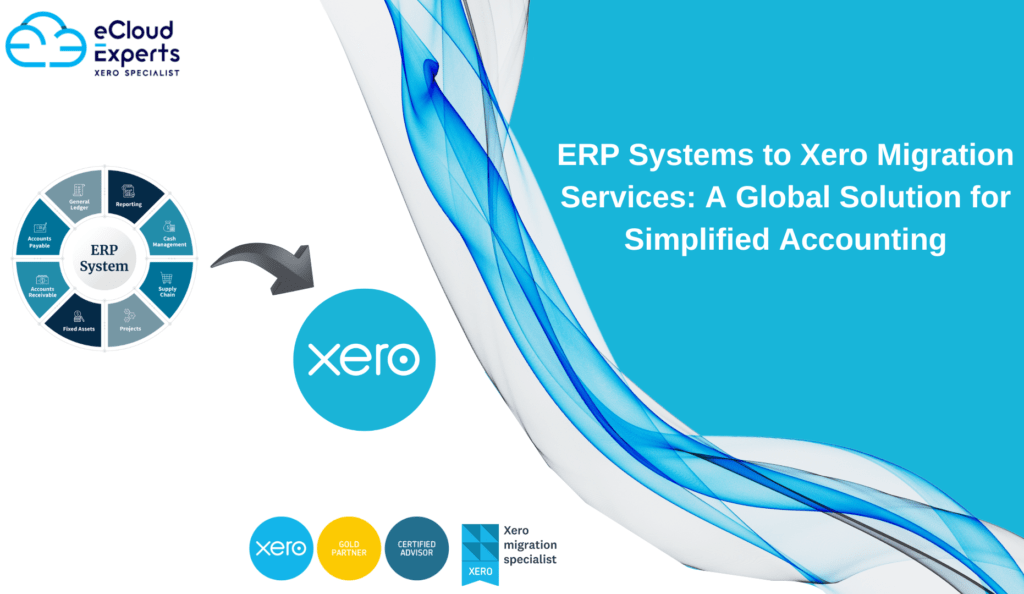
In today’s fast-paced and competitive business environment, having an adaptable, intuitive, and cost-effective accounting system is vital for success. While ERP systems like Sage 200, Microsoft Dynamics, NetSuite, and others offer robust functionality, they often come with unnecessary complexities, high costs, and rigid structures. These challenges are pushing businesses across the UK, USA, the Middle East, and beyond to switch to Xero—a cloud-based accounting platform celebrated for its simplicity, scalability, and affordability. At eCloud Experts, we specialize in ERP to Xero migration services designed to meet the unique needs of businesses globally. Whether you’re managing foreign currency manual journals, bills, invoices, bank transactions, receipts, or payments, our Xero migration experts ensure a seamless transition. Trusted by companies in regions such as the UK, USA, Middle East, Canada, Singapore, British Virgin Islands, and Jersey, we provide tailored solutions to streamline financial processes and improve efficiency. Why Migrate from ERP Systems to Xero? 1. Simplified Financial Processes ERP systems are often designed for large enterprises, and their complexity can overwhelm small and mid-sized businesses. Xero focuses on making financial management straightforward by offering: • User-friendly dashboards for real-time financial insights. • Automated bank reconciliations for efficient tracking of bank transactions. • Simplified management of bills, invoices, and receipts. • Streamlined handling of foreign currency manual journals for businesses operating internationally. Businesses in the UK, USA, and the Middle East can enjoy stress-free accounting processes, eliminating the need for extensive IT support. 2. Significant Cost Savings ERP systems like NetSuite and Microsoft Dynamics often require expensive licenses, ongoing IT support, and additional costs for maintenance. Xero offers a cost-effective alternative by: • Reducing subscription costs. • Eliminating the need for on-premise infrastructure. • Providing a single, affordable solution for all your accounting needs. For businesses in regions like Canada, Singapore, and the Middle East, migrating to Xero has resulted in savings of up to 40% annually, freeing up resources for growth and innovation. 3. Advanced Multi-Currency Support Managing international operations is simpler with Xero’s built-in multi-currency capabilities. This feature is particularly valuable for businesses in the British Virgin Islands, Jersey, and Singapore, where global transactions are commonplace. Xero simplifies this by: • Automatically updating exchange rates. • Supporting multi-currency invoicing and reconciliation. • Providing accurate reporting for international financial operations. Our Xero migration experts ensure your foreign currency data, including historical transactions, is migrated seamlessly. 4. Enhanced Management of Bills, Invoices, and Receipts Xero provides robust tools for handling all your financial documentation, including: • Automated entry and tracking of bills. • Simplified generation of invoices and receipt reconciliation. • Secure storage of receipts linked to transactions for easy auditing. At eCloud Experts, we guarantee accurate migration of all historical bills, invoices, and receipts, ensuring your financial data remains compliant and audit-ready. 5. Comprehensive App Integrations Xero integrates with over 1,000 third-party applications, providing businesses with tools to automate processes and enhance efficiency. Popular integrations include: • Synder: Automates payment reconciliation for platforms like Stripe, PayPal, and Shopify. • Unleashed: Simplifies inventory management and purchase order tracking. • A2X: Automates e-commerce sales reconciliation for platforms like Amazon and Shopify. • Gusto: Streamlines payroll management for businesses in the USA, UK, and beyond. • Hubdoc: Automates the collection and storage of financial documents, including bills and receipts. These integrations make Xero a powerful accounting hub for businesses operating across multiple platforms and regions. ERP Systems We Migrate to Xero At eCloud Experts, we have extensive experience migrating businesses from various ERP systems, including: ⮞ QuickBooks Advanced to Xero Migration⮞ Sage 200 to Xero Migration⮞ Pegasus Opera 3 to Xero Conversion⮞ Microsoft Dynamics NAV to Xero Migration⮞ Microsoft Dynamics GP to Xero Conversion⮞ Microsoft Dynamics 365 Business Central to Xero Migration⮞ Sage 300 to Xero Migration⮞ Sage X3 to Xero Conversion⮞ Sage Intacct to Xero Migration⮞ Oracle NetSuite ERP to Xero Conversion⮞. SAP Business One to Xero Migration⮞ SAP By Design to Xero Migration ⮞ MYOB Advanced to Xero Conversion⮞ Acumatica ERP to Xero Migration⮞ Infor CloudSuite to Xero Conversion⮞ Epicor ERP to Xero Migration⮞ Odoo ERP to Xero Conversion⮞ Deltek ERP to Xero Migration⮞ Tally ERP to Xero Conversion⮞ SYSPRO ERP to Xero Migration⮞ Brightpearl to Xero Migration⮞ Surf to Xero Migration⮞ AccountsIQ to Xero Conversion⮞ QuickBooks Enterprise to Xero Migration Our ERP to Xero Migration Process 1. Discovery Call We start with a detailed consultation to understand your business goals, current ERP system, and migration needs. 2. Data Mapping and Validation Our experts meticulously map your financial data to ensure accuracy. This includes: • Historical financial transactions. • Manual journals, bills, and receipts. • Purchase orders, quotes, and invoices. • Multi-currency records. 3. Migration Execution Using advanced tools and proven techniques, we securely transfer your data to Xero while preserving its integrity. 4. App Integration We integrate Xero with leading apps like Synder, Hubdoc, and Unleashed, enabling automation and improving operational efficiency. 5. Training and Ongoing Support Post-migration, we provide comprehensive training to ensure your team is confident using Xero. We also offer ongoing support to address any challenges. Frequently Asked Questions (FAQs) 1. What financial data can be migrated from my ERP system to Xero? We migrate all critical financial data, including: • Manual journals, foreign currency transactions, and purchase orders. • Bills, invoices, bank transactions, receipts, and payments. • Attachments like contracts and supporting documents. 2. How long does the migration process take? Most migrations are completed within 5-15 business days, depending on the complexity of your data. 3. Can Xero handle multi-currency transactions? Yes, Xero supports multi-currency accounting, including real-time exchange rate updates, making it ideal for businesses in the UK, USA, and the Middle East. 4. What happens to my historical bills and invoices? We ensure that all historical bills, invoices, and associated documents are accurately migrated into Xero for easy access and compliance. 5. Can Xero integrate with my existing apps? Absolutely! Xero integrates
Why Businesses Are Migrating from NetSuite to Xero to Save Money
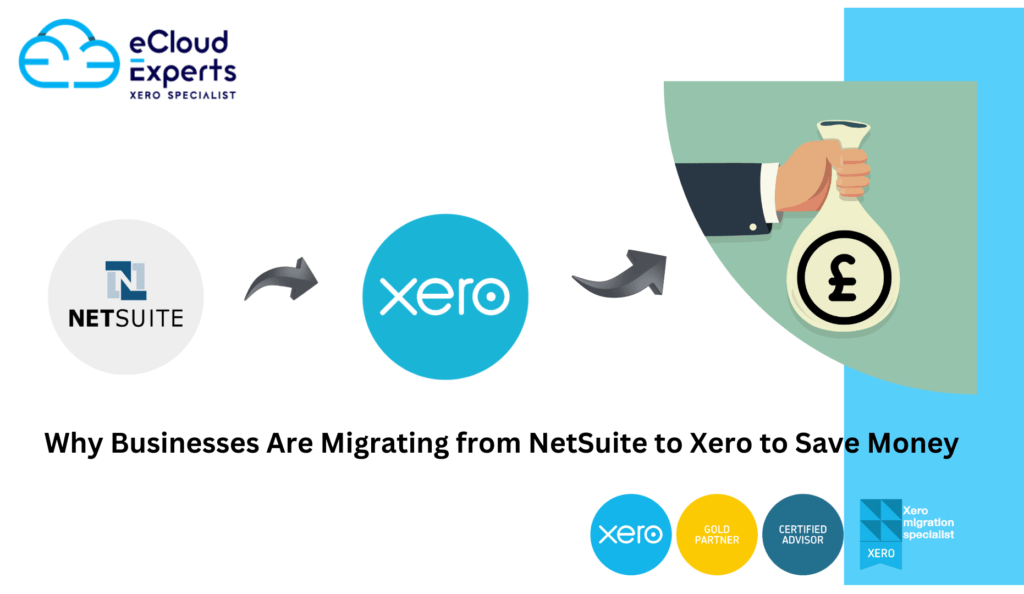
As businesses grow, their financial management needs evolve. While NetSuite is a powerful ERP solution, its high costs, complexity, and reliance on specialized consultants often outweigh its benefits for many companies. In contrast, Xero has gained popularity as a modern, intuitive, and cost-effective accounting platform. With its user-friendly interface, affordable pricing, and access to a global network of Xero consultants, Xero has become the go-to choice for businesses looking to streamline operations and reduce expenses. At eCloud Experts, our Xero migration experts specialize in transitioning businesses from NetSuite to Xero, ensuring a seamless process with significant cost savings. For example, we helped Signature Illumination Designs save over $42,000 annually by moving from NetSuite to Xero. If you’re considering a switch, here’s why migrating to Xero is a financially and operationally smart decision for your business. 1. Substantial Cost Savings NetSuite’s licensing fees, maintenance costs, and expensive customizations can quickly strain your budget. Many businesses find themselves paying for features they don’t use or need. By switching to Xero, businesses eliminate unnecessary expenses while retaining all essential accounting functions. Take Signature Illumination Designs as an example. Their annual NetSuite expenses totaled $42,000. After transitioning to Xero, they not only saved this amount but also improved their operational efficiency. By working with Xero migration experts like eCloud Experts, you can unlock these savings and redirect funds toward business growth and innovation. 2. Easier Access to Xero Consultants Finding a qualified NetSuite consultant can be challenging and costly, especially for smaller businesses. In contrast, Xero boasts a vast global network of Xero experts and Xero consultants who are readily available to assist with migrations, training, and ongoing support. This accessibility ensures that businesses have access to professional advice whenever needed, making the migration process smoother and more cost-effective. With the help of Xero migration experts, businesses can transition to Xero with confidence and minimal disruption. 3. Simplified Financial Management NetSuite’s advanced features are often unnecessary for businesses with simpler accounting needs. Xero focuses on essential functions such as: This streamlined approach eliminates the need for costly IT support and complex training. Our Xero experts help businesses transition from NetSuite to Xero, simplifying financial processes while retaining the functionality they truly need. 4. Multi-Entity and Multi-Jurisdiction Support Managing multiple entities or operating in various jurisdictions can complicate financial management. NetSuite often requires expensive customizations to handle these complexities. Xero, on the other hand, provides built-in tools such as tracking categories and consolidated reporting, which simplify these tasks. At eCloud Experts, our Xero migration specialists ensure that your multi-entity setup is correctly configured, enabling seamless operations across jurisdictions. 5. Reduced IT and Maintenance Costs NetSuite’s reliance on ongoing IT support for updates, integrations, and maintenance can add significant costs to your operations. In contrast, Xero eliminates these dependencies, allowing businesses to operate efficiently without additional IT expenses. Our Xero migration experts handle the entire migration process, ensuring your financial system is set up for long-term success without requiring expensive IT support. 6. Seamless Integration with Popular Apps One of Xero’s standout features is its ability to integrate with over 1,000 third-party apps, including tools like: These integrations replace NetSuite’s costly add-ons, enabling businesses to automate processes and improve efficiency. At eCloud Experts, we help businesses choose and integrate the right apps into their Xero ecosystem, optimizing workflows and reducing costs. 7. Real-Time Financial Insights Xero’s real-time dashboards provide instant visibility into your financial data, enabling informed decision-making. Unlike NetSuite, which often requires additional steps for reporting, Xero’s simplified financial reporting tools ensure you have access to the information you need when you need it. Our Xero migration experts configure Xero to deliver actionable insights that empower better business decisions. 8. Hassle-Free Multi-Currency Support For businesses with international operations, Xero simplifies multi-currency transactions by automatically updating exchange rates and providing accurate financial reporting across currencies. This makes Xero an ideal solution for companies operating in multiple countries. At eCloud Experts, we ensure that your multi-currency setup is seamless during the migration process, allowing you to manage global transactions effortlessly. Why Choose eCloud Experts for Your Xero Migration? At eCloud Experts, we understand that every business has unique needs. That’s why our Xero migration services are tailored to ensure a smooth transition, whether you’re moving from NetSuite, QuickBooks, or any other platform. Here’s what we offer: Start Saving Today Switching from NetSuite to Xero is more than a cost-saving measure—it’s an investment in simplified financial management and operational efficiency. With Xero’s intuitive interface, affordable pricing, and real-time insights, businesses can focus on growth without the burden of unnecessary expenses. At eCloud Experts, our Xero migration experts are here to guide you through the transition. Whether you’re looking to reduce costs, streamline operations, or access better financial insights, we’ll ensure your migration to Xero is seamless and successful. Contact us today to learn how we can help your business save money and thrive with Xero.
Why Xero Conversion Are Like Moving to a New Office: A Complete Guide by eCloud Experts
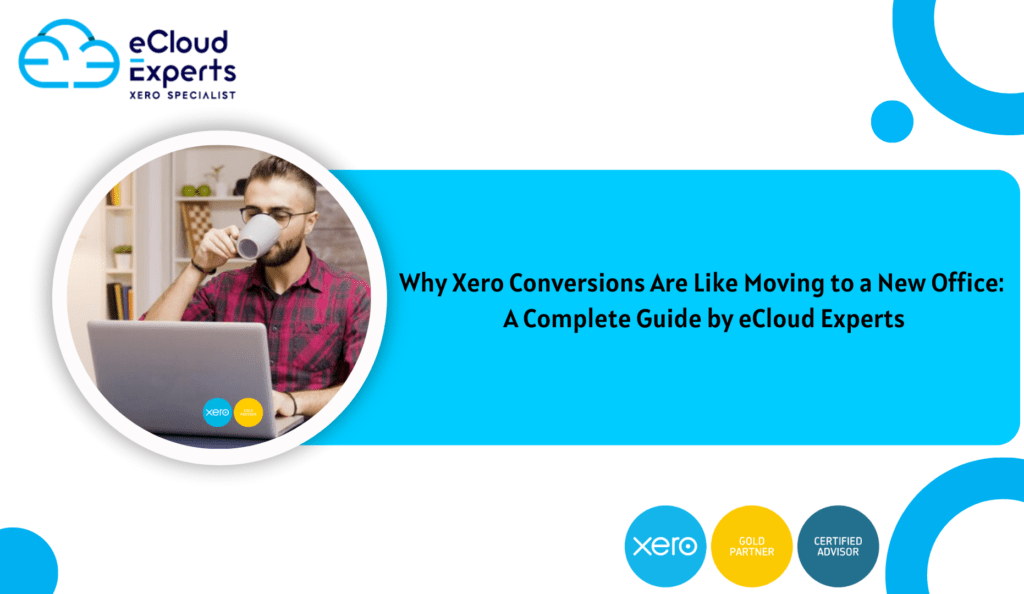
Converting your accounting system to Xero is not just about switching platforms but upgrading to a more efficient and user-friendly workspace. At eCloud Experts, we specialize in making this transition seamless, empowering businesses to leverage Xero’s robust features. As a trusted Xero Migration Partner, we ensure every migration is tailored to meet the specific needs of your business. We often compare a Xero conversion to moving into a new office. Just as an office move requires meticulous planning and organization, migrating your financial data needs careful thought and preparation. It sets you up for improved workflows and a more productive business environment when done right. Here’s why converting to Xero is like moving to a new office and how eCloud Experts, as Xero’s global migration experts, ensure a stress-free transition. 1. Clearing Out the Old Office (Your Current Accounting System) Before you can move to a new office, you need to declutter the old one. The same applies to your accounting system when converting to Xero. Legacy platforms like QuickBooks, Sage, or NetSuite often accumulate unnecessary data over time, such as duplicate records, inactive accounts, and incomplete transactions. At eCloud Experts, we: By starting with clean, accurate data, your Xero setup becomes more efficient and easier to manage. 2. Planning the Move (The Xero Conversion Process) Just as moving to a new office requires detailed planning to ensure nothing gets lost, a successful Xero conversion involves organizing your data and addressing potential challenges in advance. Here’s how our migration experts handle the conversion process: With our expertise, we anticipate and resolve potential roadblocks, ensuring your financial data is accurately transferred to Xero. 3. Settling Into the New Office (Your Xero Setup) Once the migration is complete, the next step is to configure your Xero account to fit your business needs. This is similar to arranging your new office for optimal functionality. We help you: The result is a fully customized Xero setup that supports your operations and growth. 4. Why Choose Xero? (Your New Office Benefits) Switching to Xero offers significant advantages over legacy systems. Here’s why businesses choose Xero as their new accounting solution: Moving to Xero isn’t just a change—it’s an upgrade to a smarter, more efficient accounting system. 5. Why Work With eCloud Experts? At eCloud Experts, we’ve helped businesses worldwide convert to Xero. Whether you’re transitioning from Sage, QuickBooks, or NetSuite, our tailored approach ensures a smooth process. Here’s why businesses trust us: As a Xero Gold Champion Partner, we are committed to delivering an efficient and stress-free migration experience. 6. Multi-Jurisdiction Conversions: A Specialty of eCloud Experts For businesses operating across multiple regions, ensuring compliance is critical during a Xero conversion. At eCloud Experts, we are experienced in navigating complex multi-jurisdiction requirements. Here’s how we help: As Xero experts, we ensure your migration is compliant and optimized, regardless of your location. 7. Ready to Move to Xero? Converting to Xero is a strategic move that sets your business up for greater efficiency and growth. With eCloud Experts, the process is simple, efficient, and tailored to your unique needs. Whether you’re a small business or managing multiple entities, we handle every aspect of the migration to ensure a seamless transition. Contact Us Today Are you ready to switch to Xero? Contact eCloud Experts, your trusted Xero Migration Partner, for a free consultation. Let us help you make your Xero conversion journey stress-free and ensure your accounting system supports your business success.
